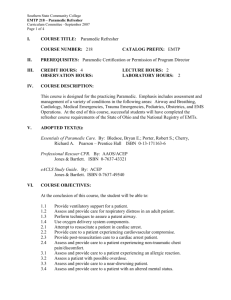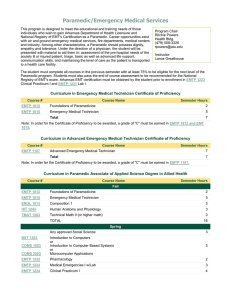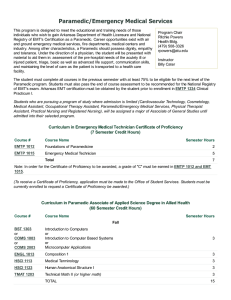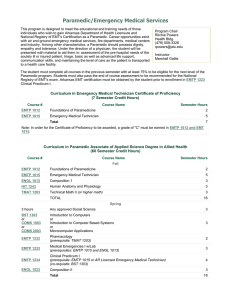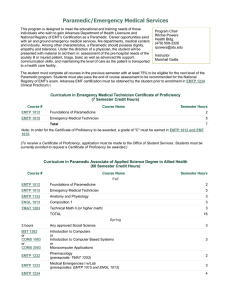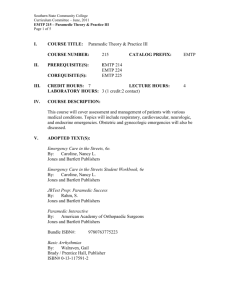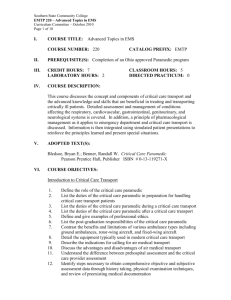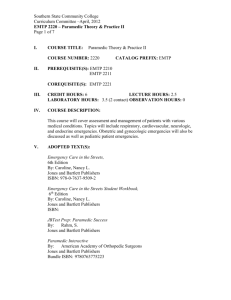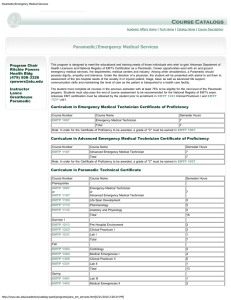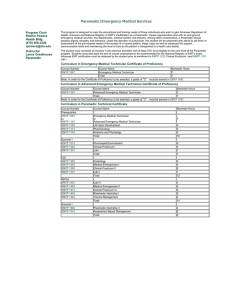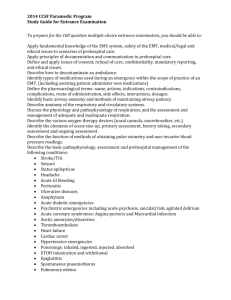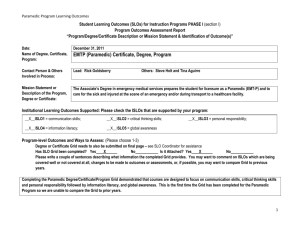Paramedic/Emerg Medical Servic Course Descriptions
advertisement
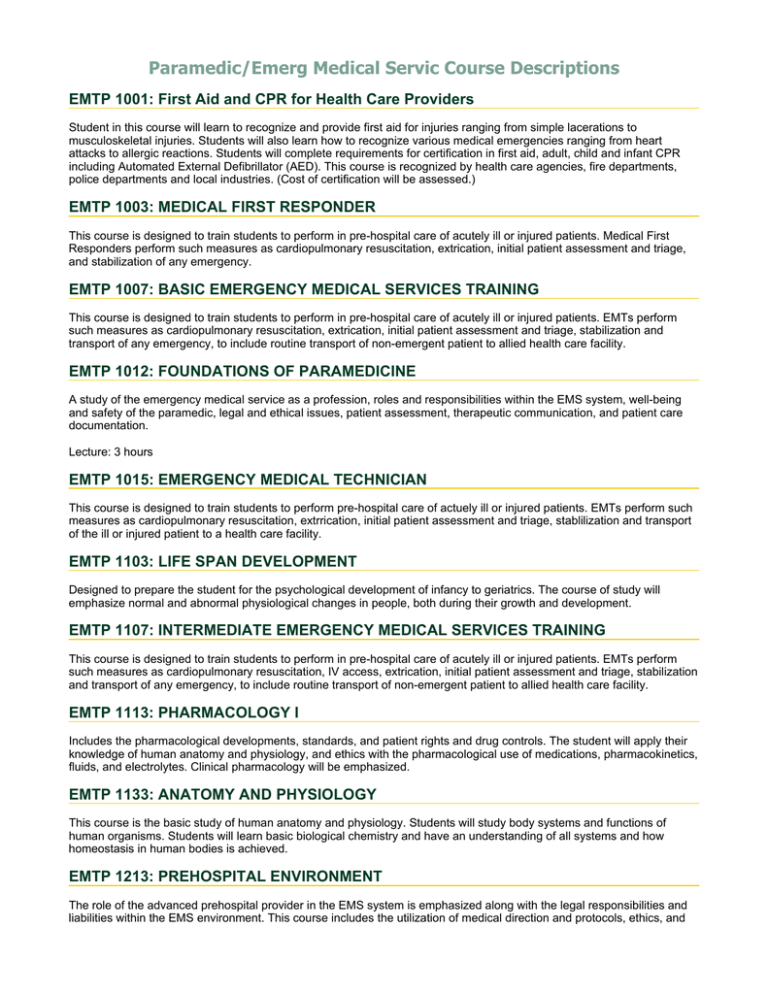
Paramedic/Emerg Medical Servic Course Descriptions EMTP 1001: First Aid and CPR for Health Care Providers Student in this course will learn to recognize and provide first aid for injuries ranging from simple lacerations to musculoskeletal injuries. Students will also learn how to recognize various medical emergencies ranging from heart attacks to allergic reactions. Students will complete requirements for certification in first aid, adult, child and infant CPR including Automated External Defibrillator (AED). This course is recognized by health care agencies, fire departments, police departments and local industries. (Cost of certification will be assessed.) EMTP 1003: MEDICAL FIRST RESPONDER This course is designed to train students to perform in pre-hospital care of acutely ill or injured patients. Medical First Responders perform such measures as cardiopulmonary resuscitation, extrication, initial patient assessment and triage, and stabilization of any emergency. EMTP 1007: BASIC EMERGENCY MEDICAL SERVICES TRAINING This course is designed to train students to perform in pre-hospital care of acutely ill or injured patients. EMTs perform such measures as cardiopulmonary resuscitation, extrication, initial patient assessment and triage, stabilization and transport of any emergency, to include routine transport of non-emergent patient to allied health care facility. EMTP 1012: FOUNDATIONS OF PARAMEDICINE A study of the emergency medical service as a profession, roles and responsibilities within the EMS system, well-being and safety of the paramedic, legal and ethical issues, patient assessment, therapeutic communication, and patient care documentation. Lecture: 3 hours EMTP 1015: EMERGENCY MEDICAL TECHNICIAN This course is designed to train students to perform pre-hospital care of actuely ill or injured patients. EMTs perform such measures as cardiopulmonary resuscitation, extrrication, initial patient assessment and triage, stablilization and transport of the ill or injured patient to a health care facility. EMTP 1103: LIFE SPAN DEVELOPMENT Designed to prepare the student for the psychological development of infancy to geriatrics. The course of study will emphasize normal and abnormal physiological changes in people, both during their growth and development. EMTP 1107: INTERMEDIATE EMERGENCY MEDICAL SERVICES TRAINING This course is designed to train students to perform in pre-hospital care of acutely ill or injured patients. EMTs perform such measures as cardiopulmonary resuscitation, IV access, extrication, initial patient assessment and triage, stabilization and transport of any emergency, to include routine transport of non-emergent patient to allied health care facility. EMTP 1113: PHARMACOLOGY I Includes the pharmacological developments, standards, and patient rights and drug controls. The student will apply their knowledge of human anatomy and physiology, and ethics with the pharmacological use of medications, pharmacokinetics, fluids, and electrolytes. Clinical pharmacology will be emphasized. EMTP 1133: ANATOMY AND PHYSIOLOGY This course is the basic study of human anatomy and physiology. Students will study body systems and functions of human organisms. Students will learn basic biological chemistry and have an understanding of all systems and how homeostasis in human bodies is achieved. EMTP 1213: PREHOSPITAL ENVIRONMENT The role of the advanced prehospital provider in the EMS system is emphasized along with the legal responsibilities and liabilities within the EMS environment. This course includes the utilization of medical direction and protocols, ethics, and the well being of EMS personnel with an emphasis on illness and injury prevention. Rescue, stress management, and mass casualty response will be included in this course. Hazardous materials as well as violent situations will be covered with an emphasis on personal and bystander safety. The patient assessment portion will include history taking, interview skills, and the physical exam. EMT level assessment techniques will be readdressed in addition to the introduction of paramedic level skills/techniques. EMTP 1223: CLINICAL PRACTICUM I The student will receive supervised/ preceptor clinical experience in the emergency department, respiratory therapy, and operating room. Students will perform patient procedures under the guidance of a professional health care preceptor with expertise in the patient care area. Students will observe care of critical and non-critical patients. Students will be required to assess and document on specific age and diverse complaint based patients while in the clinical area. Students will earn a team approach in the clinical area while performing basic and advanced patient skills check-off in Lab I. EMTP 1231: LAB I Review and successfully perform EMT Basic skills. Advanced skill demonstration and proficient performance evaluations that will prepare the student for practical use in clinical and field internship. Advanced airway, intravenous therapy, intramuscular injections, and IV medication administration. Emphasis on patient rights in the area of health care. EMTP 1232: PHARMACOLOGY Prerequisite: TMAT 1203 Includes the pharmacological developments, standards, patient rights and drug controls. The student will apply their knowledge of human anatomy and physiology, and ethics with the pharmacological use of medications, pharmacokinetics, fluids, and electrolytes. Clinical pharmacology will be emphasized. Lecture: 3 hours EMTP 1233: MEDICAL EMERGENCIES I W/LAB Prerequisite:EMTP 1015 and ENGL 1013 This course will present the student with the pathophysiology, clinical assessment and treatmetn of patients presenting with specific illness. Pulmonology, neurology, endocrinology, allergies, anaphylaxis, gastroenterology, urology, nephrology, toxicology, substance abuse, hematology, enviromental emergencies, and infectious disease will be included in this section with an emphasis on assessment based managemetn of presnt illness and focused patient complaints for effective field treatment. the lab section will include performance of both basic and advanced prehospital airway management techniques and medication administration in a lab environment. Students must successfully demonstrate each skill through a pass/fail scenario for successful course completion. Application of these skills will be reassessed in the clinical setting. Lecture: 3 hours, Laboratoryi: 1 hour EMTP 1234: CLINICAL PRACTICUM I Prerequisite: EMTP 1015, Arkansas Licensed Emergency Medical Technician Co-requisite: BST 1303 The student will receive supervised clinical experience in the emergency department and operating room. While in these areas, the student will perform patient procedures under the guidance of a professional health care preceptor with expertise in the patient care area while also observing all care. Students will be required to assess and document on specific age and diverse complaint based patients while in the clinical area. Patient documentation will be placed and maintained in an online database. A team approach will be emphasized in the clinical area while performing basic and advanced patient skills. Age and condition requirements must be met in the clinical setting and may be found in the program handbook. Clinical: 4 hours EMTP 1303: CARDIOLOGY This course is designed to train students to understand the pathophysiology, assessment and management of cardiac patients to include pharmacological and electrical interventions. The pharmacology section will focus on the study, preparation, administration, and indications of cardiac medications. Students will gain knowledge of EKG (ECG) monitoring of leads I, II, and III with an emphasis on the study of arrhythmia etiologies and irregular waveforms. The American Heart Association (AHA) Advanced Cardiac Life Support (ACLS) will be administered during this course. ACLS is designed to offer health care professionals a high-density course of advanced cardiac knowledge and treatment. Critical thinking skills will be examined through case based scenarios as well as a written test. In addition to the regular coursework, students must successfully complete ACLS practical (Pass/Fail) and written exam (84%) to sucessfully complete Cardiology. (Certification costs will be assessed.) EMTP 1304: MEDICAL EMERGENCIES I This course will present the student with the pathophysiology, clinical assessment and treatment of patients presenting with specific illness. Pulmonology, neurology, endocrinology, allergies, anaphylaxis, gastroenterology, urology, nephrology, toxicology, substance abuse, hematology, environmental emergencies, and infectious disease will be included in this section with an emphasis on assessment based management of present illness and focused patient complaints for effective field treatment. EMTP 1305: CLINCIAL PRACTICUM II The student will apply basic and advanced assessment and procedures in the emergency department, Intensive Care Unit, and Operating Room while under supervision of preceptor and/or clinical coordinator. The student will have specific age and patient conditions to evaluate and assist in management of care in the ER department. EMTP 1331: LAB II Will be re-evaluated in basic skills learned in Lab I. Students will learn the application of EKG monitors, pacing, synchronized cardioversion, pacing and the practical use of pulmonary oximeters. Students will apply the knowledge of advanced patient assessment to clinical scenarios. EMTP 1401: LAB III Will demonstrate all skills learned in Labs I and II. Students will learn pediatric skills such as airway management, invasive therapy, and advanced trauma skills. Students will also demonstrate competency in advanced cardiac life support, pediatric life support, and pre-hospital trauma life. EMTP 1403: MEDICAL EMERGENCIES II This course is designed to train students to understand the pathophysiology, assessment and management of infectious disease, abuse or assault, geriatrics, pediatrics, neonatology, and OB/GYN. Emphasis will be placed on assessment based management of present illness and focused patient complaints. The American Heart Association (AHA) Pediatric Advanced Life Support (PALS) program will be presented during this course. PALS is designed to provide health care professionals a greater knowledge of emergency care for the pediatric patient. Airway management, specialized procedures and pharmacological techniques will be addressed. The PALS program stresses critical thinking skills and the student will be examined through case based scenarios as well as a written test. In addition to the regular coursework, students must successfully complete the PALS practical exam (Pass/Fail) and written exam (84%) for successful completion of Medical Emergencies II. (Certification costs will be assessed.) EMTP 1413: CLINCIAL PRACTICUM III Designated preceptors and/or clinical coordinator in the following areas will supervise students: Intensive Care Unit, Surgical Recovery, and Operating Room, and Labor & Delivery. Students will apply knowledge of course information learned and perform procedures that are appropriate for these areas of hospital. Students will have patient condition and age specific criteria to evaluate in this session that is mandatory to course completion. EMTP 1423: TRAUMA MANAGEMENT This course is intended to present the student with a comprehensive insight into traumatic injury. Pathophysiology, assessment, and management of trauma to include blunt, penetrating, soft-tissue, burn, musculoskeletal, head, face, neck, spinal, thoracic, and abdominal trauma as well as hemorrhage and shock will be analyzed. Types and phases of shock will be explored to provide the student assessment knowledge for the treatment of various shock conditions. Epidemiology of trauma will be discussed as well as the Arkansas Trauma System. The course will culminate with the National Association of Emergency Technicians (NAEMT) Prehospital Trauma Life Support (PHTLS). PHTLS is designed to refine the student's trauma knowledge and critical thinking skills through lecture, practical applications, and case based management scenarios. The student will also receive insight into special circumstances and alternative treatment methods for trauma victims. (Certification costs will be assessed.) EMTP 1424: PARAMEDIC INTERNSHIP I Preceptors in the field will supervise patient assessment and management skills during the student's pre-hospital rotation. Students will have a greater understanding of EMS systems and dispatching or emergencies with a higher level of competency in patient report transmission to the ED's and patient report documentation. Students must successfully complete ACLS, the program's skill and critical thinking competency, to be scheduled for an interview with the program medical director prior to scheduling their internship rotation. EMTP 1504: PARAMEDIC INTERNSHIP II Continuation of Internship I with evaluation by designated preceptors in the pre-hospital environment. Students must achieve a level of understanding, professionalism and clinical knowledge of pre-hospital emergency care to be recommended by the medical director and program director to enter this phase of the paramedic program. Students must perform patient assessment and management skills while under supervision of experienced preceptors including the ability to perform as a team leader in the pre-hospital setting during this phase of the program. A closer evaluation of student's character and professionalism will be emphasized. This course will be the student's final step in pre-hospital field evaluation. EMTP 1512: ASSESSMENT BASED MANAGEMENT The student will learn the final aspects of pre-hospital care and management in this session of the paramedic program. The student will learn effective scene and patient management, critical thinking and clinical decision-making. This session will serve as a final analysis of the student's ability to analyze patient information and provide the treatment necessary for the best outcome of the patient's condition. The student must have an understanding of all tasks required of the paramedic provider in the pre-hospital setting prior to the final exit of the paramedic program. EMTP 2111: CLINICAL PRACTICUM II Prerequisite: EMTP 1234 A continuation of Clinical Practicum I. The student will apply basic and advanced assessment and procedures in the emergency department and operating room while under supervision of preceptor and/or clinical coordinator. Age and condition requirements must be met in the clinical setting and may be fouind in the program handbook. Clinical: 1 hour EMTP 2112: CARDIOLOGY I This course is designed to train students to understand the pathophysiology, assessment, and management of cardiac patients to include pharmacological and electrical interventions. The pharmacology section will focus on the study, preparation, administration, and indications of cardiac medications. Students will be presented with EDK (ECG) monitoring of leads I, II, and III with an emphasis on the study of arrhythmia etiologies and irrecgular waveforms. An overview of 12-lead techniques will also be discussed. Lecture: 2 hours EMTP 2113: LIFE SPAN DEVELOPMENT Designed to prepare the student for the psychological development of infancy to geriatrics. The course of study will emphasize normal and abnormal physiological changes in people, both during their growth and development. Lecture: 3 hours EMTP 2211: CLINICAL PRACTICUM III Prerequisite: EMTP 2111 Designated preceptors and/or clinical coordinator in the following areas will supervise students: Intensive Care Unit, Surgical Recovery, Operating Room, and Labor and Delivery. Students will apply knowledge of all previous program coursework and perform procedures that are appropriate for these areas of hospital. Age and condition requirements must be met in the clinical setting and may be found in the program handbook. Clinical: 1 hour EMTP 2212: EMERGENCY MEDICAL SERVICES OPERATIONS Prepares prehospital care providers to perform in an operations role within the EMS system. This course includes the utilization of medical direction and protocols, rescue, and mass casualty response. Hazardous materials as well as violent situations will be covered with an emphasis on personal and bystander safety. Students will also be expected to successfully complete the Federal Emergency Management Agency National Incident Management System curriculum via the FEMA Emergency Management Institue website during this course. Lecture: 2 hours EMTP 2221: CARDIOLOGY II LAB Co-requisite: EMTP 2222 Prepares prehospital care providers for theuse and application of cardiac monitors (semi-automated and manual), vagal maneuvrs, waveform capnography, and pulse oximetry. Application of these skills will be reassessed in the clinical setting. Laboratory: 1 hour EMTP 2222: CARDIOLOGY II Co-requisite: EMTP 2221 This course is designed to introduce students to the practical application of pathophysiology, assessment and management of cardiac patients to include pharmacological and electrical interventions. The American Heart Association (AHA) Advanced Cardiac Life Support (ACLS) will be administered during this course. ACLS is designed to offer health care professionals a highi-density course of advanced cardiac knowledge and treatment. Critical thinking skills will be examined through case based scenarios as well as a written test. In addition to the regular coursework, students must successfully complete ACLS practical (Pass/Fail) and written exam (84%) to successfully complete Cardiology II. Lecture: 2 hours EMTP 2313: MEDICAL EMERGENCIES II WITH LAB Prerequisite: EMTP 1233 This course is designed to train students to understand the pathophysiology, assessment and management of infectious disease, abuse or assault, geriatics, pediatrics, neonatology, and OB/GYN. Emphasis will be placed on assessment based management of present illness and focused patient complaints. The American Heart Association (AHA) Pediatric Advanced Life Support (PALS) program will be presented during this course. PALS is designed to provide health care professionals a greater knowledge of emergency care for the pediatric patient. The PALS program stresses critical thinking skills and the student will be examined through case based scenarios as well as a written test. In addition to the regualr coursework, students must successfully complete the PALS practical exam (Pass/Fail) and written exam (84%) for successful completion of Medical Emergencies II. (Certification costs will be assessed.) Students will demonstrate all skills covered in Medical Emergencies I, Cardiology Lab, and PALS. Lecture: 3 hours, Laboratory: 1 hour EMTP 2316: PARAMEDIC INTERNSHIP Prerequisite: EMTP 2211 This course is divided into two phases. Phase I students will be placed with preceptors in the field who supervise patient assessment and management skills during the student's prehospital rotation. Students will demonstrate a greater understanding of EMS systems, dispatching, and emergencies with a higher level of competency in both verbal and written documentation. Upon completion of Phase I, each student must demonstrate a level of understanding, professionalism and clinical knowledge of prehospital emergency care to be recommended by the medical director and/or clinical coordinator to enter Phase II of Paramedic Internship. Phase II students must perform patient assessment and management skills while under supervision of experienced preceptors including the ability to perform as a team leader in the prehospital setting during this phase of the program. A closer evaluation of student's character and professionalism will be emphasized. This couirse will be the student's final step in prehospital field evaluation. Clinical: 6 hours EMTP 2322: ASSESSMENT BASED MANAGEMENT This course includes the final aspects of pre-hospital care and management in this session of the paramedic program. The student will learn effective scene and patient management, critical thinking, and clinical decision-making. This session will serve as a final analysis of the student's ability to analyze patient information and provide the treatment necessary for the best outcome of the patient's condition. The student must have an understanding of all tasks required of the paramedic exam, computerized end of course final, and an oral interview by the program medical director must be successfully completed to complete this course. Upon successful completion of this course, the student will be recommended as a candidate for Paramedic National Registry of EMT's testing. Lecture: 2 hours EMTP 2323: TRAUMA MANAGEMENT This course is intended to present the student with a comprehensive insight into traumatic injury. Pathophysiology, assessment, and management of trauma to include blunt, penetrating, soft-tissue, burn, musculoskeletal, head, face, neck, spinal, thoracic, and abdominal trauma as well as hemorrhage and shock will be analyzed. Types and phases of shock will be explored to provide the student assessment knowledge for the treatment of various shock conditions. Epidemiology of trauma will be discussed as well as the Arkansas Trauma System. Lecture: 3 hours EMTP 2991: SPECIAL TOPICS FOR PARAMEDICS/EMERGENCY SERVICES This course is designed to introduce students to specific areas in Paramedic/Emergency Medical Services. Course content and credit are designed to meet the needs of the student. The topic will vary from offering to offering; thus, the course may be taken more than once for a total of 6 hours. This course requires 15 clock hours per one semester credit hour. EMTP 2992,2993,2994,2995,2996: SPECIAL TOPICS FOR PARAMEDICS/EMERGENCY MEDICAL SERVICES This course is designed to introduce students to specific areas in Paramedic/Emergency Medical Services. Course content and credit are designed to meet the needs of the student. The topic will vary from offering to offering; thus, the course may be taken more than once for a total of 6 hours. This course requires 15 clock hours per one semester credit hour.
